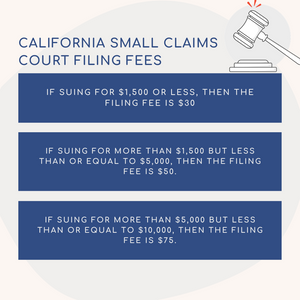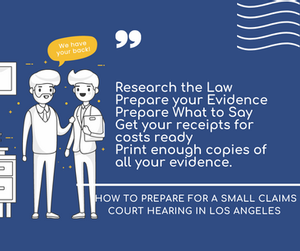Contents
Do you want to know more about what a small claims hearing is like in Los Angeles? Prepare yourself for the big day!
In this article learn about:
Background on Los Angeles small claims court
How to prepare before the hearing date
What to expect at the Small Claims Hearing
How to watch a live small claims hearing!
Small claims mediation
Background on Los Angeles Small Claims Court
Virtual Hearings
With COVID-19, if you sue in Los Angeles County small claims you now have the option of attending your small claims hearing online. The court charges $15 for an audio-only/phone hearing (not recommended) and $23 for a video hearing (recommended). Our clients have been enjoying the virtual hearing format! Note, you can still attend your hearing in person.
The maximum amount you can sue for
In Los Angeles small claims, the maximum you can sue for is:
$12,500 if you are an individual
$6,250 if you are a business
Remember, the maximum you can sue for isn't determined by who you are suing but rather who is doing the suing. If you are owed more than the maximum, you are agreeing to waive that additional amount by suing in small claims. For example, if you were in a car accident and the damages to your car are $14,000, you can only sue for $12,500. You agree to waive the additional $1,500 in damages.
Read More: How to sue a company in Los Angeles County Small Claims Court
Filing Fees
The Los Angeles small claims court filing fees depend on how much you are suing for. Generally, you will pay between $30- $75 to file the lawsuit.
Note: If you cannot afford to pay court fees, you can ask the court to waive the fees.
Learn how to file your Los Angeles small claims court lawsuit.

Serving Fees
Once the small claims lawsuit is filed, you have to notify the person you sued that they have been sued. This is called serving.
There are a few different ways to serve your small claims lawsuit:
You can have your friend serve your lawsuit. This is how you can serve your lawsuit for free (but you may have to buy your friend lunch!)
You can have the sheriff serve your lawsuit. It would have to be the sheriff in the county where the person you are suing is located. This tends to cost $40 but not every county offers this service. You have to call the sheriff's department in the county where the person you sued lives or works to confirm.
You can hire someone to serve your lawsuit. A process server is someone who has a license to serve lawsuits. The costs vary depending on the county but they generally cost between $75 to $150.
Read More:8 Tips on how to win your California Small Claims Lawsuit
If you win, you can request that the person you sued pay for your court fees and serving costs.
How to prepare for a Small Claims Hearing before the hearing?
Alright, you have filed, served, and filed the proof of service for your small claims lawsuit in Los Angeles. What is next? Preparing for the small claims hearing!

Research the law.
Are there any laws that support you winning the lawsuit?
For example: did your landlord follow the rules surrounding the return of your security deposit?
Did your mechanic follow the rules around providing an estimate before conducting the repairs?
A quick google search should pull up what you are looking for. When in doubt, consult an attorney!
Lawsuits involving contracts.
First off, what is a contract? A contract is a written or verbal promise to do something in return for something else.
You want to be prepared to explain to the judge what the contract required you to do (pay or do something) and what the contract required the other person to do (pay or do something).
Read More: Los Angeles Small Claims Court and Fictitious Business Names
For example, if you and a painter agreed you would pay $1,000 for them to paint your house a contract generally was formed. You agreed to pay them $1,000 and in return, they would paint your house.
The judge will also want to know what other terms were agreed to. For example, when were you going to pay the painter the $1,000? Before or after the painting was complete? When was the painter supposed to paint your house? Who would buy the paint, etc.
Prepare your evidence.
Some examples of what counts as evidence: pictures, text messages, emails, invoices, contracts, receipts, videos, etc.
Ask yourself, what am I suing for and how will I prove to the judge I am right?
While you may not have everything in writing, make sure you do bring what you have! If you do not have something in writing, a judge may base their decision on your credibility.
You want to have your evidence organized with titles, dates, and why that piece of evidence is important. All your evidence should be geared towards showing the judge why you are correct!
What not to include? Evidence that is not relevant to why you are suing. Keep the judge focused on why you are suing and why you should win!
Print enough copies of all your evidence. You will need at least three copies (one for you, one for the judge, one for the other side).
Don't forget that your evidence has to be mailed to the court and other party before the hearing date! Learn more here.
Prepare what to say.
Try to start off by telling the judge a big picture summary in two sentences or less.
For example:
"Your honor, I am suing my ex-landlord because they failed to return my $800 security deposit".
"Your honor, I am suing the mechanic for $1,000 because they didn't repair my car and that is how much I paid them."
Then, go into more specific details. Make sure you don't go off on a tangent!
The judge will ask you questions as you tell your side of the story. Make sure you answer the judge's question first and then add any additional facts if necessary!
Be prepared to address anything the person you sued may bring up.
But most importantly, DO NOT INTERRUPT! You do not want to interrupt the judge or the person you sued. Once they are done speaking, ask "Your honor, may I add something?"
Get your receipts for costs ready.
For example, any filing fees and any process server costs. Make sure to let the judge know that you would like to be reimbursed for costs. Generally, whoever wins the case can be reimbursed for "reasonable costs."
JusticeDirect will create a judge friendly evidence and receipt packet for you to take with you to the small claims hearing! Learn More.
What to Expect at the Small Claims Hearing
On the hearing day, you want to give yourself plenty of time to arrive at the courthouse, go through security, and find the courtroom. You don't want to be late! If you are late, the judge may close your lawsuit.
Once you are in the courtroom
Once the courtroom is opened, the court clerk, sheriff, and judge will go through what to expect. You will be sitting in a room with other people who have filed small claims cases. You will get to watch the cases scheduled before your case.
If both parties show up:
Right before the hearing, the judge will ask both you and the person you sued show each other the evidence.
The Judge will ask you why you are suing.
Then the judge will ask the person you sued their side of the story.
The hearing will last around 15 minutes.
The judge will ask you to show the judge the evidence you brought with you. Sometimes the judge will keep the evidence. Otherwise, you will get the evidence right back.
Very rarely a judge will tell you who won or lost immediately after the hearing. Instead, the judge will tell you that their decision will be mailed to them (usually takes a few weeks to two months or so).
If only you show up but the person you sued does not show up:
You still have to prove to the judge why you should win.
If only the person you sued shows up:
The judge will close the lawsuit.
Read More: How to request a free translator in Los Angeles County Small Claims Court
Are attorneys allowed in small claims courts?
Attorneys are not allowed to represent you or the person you sued at the initial hearing in Los Angeles County Small Claims Court. If the person you sued appeals (meaning they lost and want the judge to decide again) then attorneys are allowed to represent the parties at the appeal hearing.
How to watch a live small claims hearing
One of the best ways to prepare for a small claims hearing is to watch one live! While you cannot watch live Los Angeles small claims hearings at the moment due to COVID-19, other counties stream their live small claims hearings!
How to Live Stream Small Claims hearings in Ventura County:
Go to the Ventura Court's website.
Click Courtroom S1.
Hearing days and times:
Mondays starting at 9:00 am
Wednesdays starting at 9:00 am and 1:30 pm
*Note, the live stream does not seem to work on Google Chrome.
Read More: How to Access Your Los Angeles Small Claims Court Files Online
Legal Terms to Know While Watching the Small Claims Hearings
Plaintiff: The person who is suing.
Defendant: The person being sued.
Parties: Both the plaintiff and the defendant.
Pro Term Judge: Volunteer attorney participating as a temporary Judge.
Proof of Service: Verification that the defendant has been served.
Service of Process: The process of notifying the defendant that a lawsuit has been filed against them.
For more legal terms visit our Guide to Legal Jargon.
Small Claims Mediation
Some small claims courts offer free mediation on the date of your hearing or before your hearing date.
What is mediation? Mediation is a meeting between both you and the person you sued conducted by a neutral third-party (a mediator). The parties will meet with a mediator, discuss their case, and try to reach a mutually beneficial solution. Both parties must agree to mediation and it cannot be forced on them.
When will mediation occur? The court clerk, judge, or sheriff will announce if there are mediators available that day. Usually, the judge will tell the audience that if you opt for mediation, you can try to mediate the case while other hearings are being conducted. If you finish the mediation early, then you get to "skip the line" and your case is processed faster.

Camila Lopez, Esq.
Attorney at JusticeDirect. Camila holds a law degree and is a certified mediator. Her passion is breaking down complicated legal processes so that people without an attorney can get justice.

